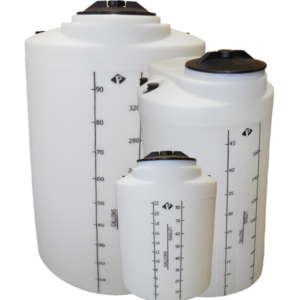For the agricultural industry, polyethylene tanks have proven to be a reliable, go-to storage solution for years because of their durability, low maintenance, and less expensive price point than fiberglass or stainless-steel tanks. For growers and pesticide application businesses, the benefits of using tanks constructed of polyethylene are numerous.
 Typical Agriculture Applications
Typical Agriculture Applications
- Storage and transportation of micronutrients
- Storage and transportation of liquid fertilizer
- Storage and transportation of pesticides and herbicides
Compatibility
Poly tanks are extremely compatible with many of the liquid products used in agriculture businesses. But different types of plastic resins have different chemical compatibilities. For example, linear polyethylene (LPE) might be an excellent choice for one chemical, but not compatible with another. Although LPE is great for a wide range of ag chemicals, nothing is a cure-all for all chemicals.
Ease of Use
Like all equipment and asset purchases, growers and other agriculture business owners want tanks that make their jobs easier. Polyethylene tanks are lighter weight and easy to handle, which makes it easier to move if it needs to be relocated. Many poly tanks are designed with molded-in calibration for quick level assessment. They are also available in a wide range of capacities, including large capacities that make bulk ordering of products and field storage of ag chemicals more convenient and less expensive.
Durability and Resistance
Almost all plastic storage tanks are manufactured from highly durable, chemical-resistant resins, like Linear Polyethylene Resins (LPE), which is specifically formulated for making rotationally molded plastic storage tanks. These premium resins are made with excellent UV inhibitors that help provide long term UV resistance, even in the most severe weather conditions. Poly tanks are also corrosion-resistant and won’t rust, making them perfect for today’s pesticide, herbicide and fertilizer products.
Longevity
While no storage tank is designed to last a lifetime, the durable resins and added UV inhibitors used in the manufacture of polyethylene tanks can mean several more years of service. Some poly tanks can last up to 20 years or more. A tank’s longevity depends on a few things: the type of resin used, the products stored in it, and the environment it is stored in.
To prolong a poly tank service life, routine inspections to assess its structural integrity are crucial. It’s recommended to do an inspection in the spring before filling the tank with fertilizer, pesticide, or other products, and once again in the fall at the end of the growing season.
Specific Gravity Rating
Another consideration for prolonging the life of a polyethylene tank used in the agriculture industry is choosing a higher specific gravity rating. The specific gravity rating is a measure of the tank’s ability to withstand the weight of the liquid it is storing. If the tank isn’t thick enough, it will begin to bulge under the weight of a heavier product and that coils not only affect the tank service life, but also put stress on valving and piping attached to the tank. Most polyethylene tanks are rated for water only weight, standard duty and heavy duty wall thicknesses, offering the user a choice in how the tank will perform with their specific application.
The vast majority of fertilizer solutions and other ag chemicals are between 1.0 and 1.25 specific gravity and can safely be stored in a standard duty (1.5 specific gravity) rated tank. For heavier liquids, as well as products that are oxidizers or reactive, you may want to consider the Heavy Duty (1.9 specific gravity) wall, which will not only provide a stiffer wall that will minimize bulging (a normal occurrence in plastic tanks) and also offer a longer service life in a corrosive application.
Pro tip: tank ratings are assuming ambient temperatures, if you will experience higher temperatures this should also be factored into your plan.
About Peabody’s Tanks
Peabody Engineering’s roots are in the agricultural fertilizer equipment business. We understand the unique needs of the industry, and for over forty years, we’ve manufactured storage solutions for growers across the county, including our ProChem® potable water and chemical tank products, designed for agricultural and industrial chemical applications where a single-walled design is desired.
Capacities from 25 to 1500 gallons are manufactured with a premium MDLPE UV-20 rated resin, and XLPE as standard options, and are also available in PPL and PVDF for more demanding applications. Our ProChem® tanks are NSF/ANSI/CAN 61 certified (XLPE tanks 40 gallons and below are not NSF/ANSI/CAN 61 certified) and include an integrally molded pump mounting platform on top and standard process fittings for fill and discharge on most sizes. Supplied with a large, vented access opening and easy to read calibration in liters and gallons, the ProChem® potable water and chemical tank line offer standard features not previously available.
Different manufacturers use different resins with varying performance specifications. Most tank manufacturers use resins with a UV rating from 8-12 years. We are now using resins that have UV inhibitors rated for 20 years, so UV attack is much less of a factor than it once was with polyethylene storage tanks.
Visit our Catalog for more information and Part Numbers for our ProChem® Tanks.

 Typical Agriculture Applications
Typical Agriculture Applications